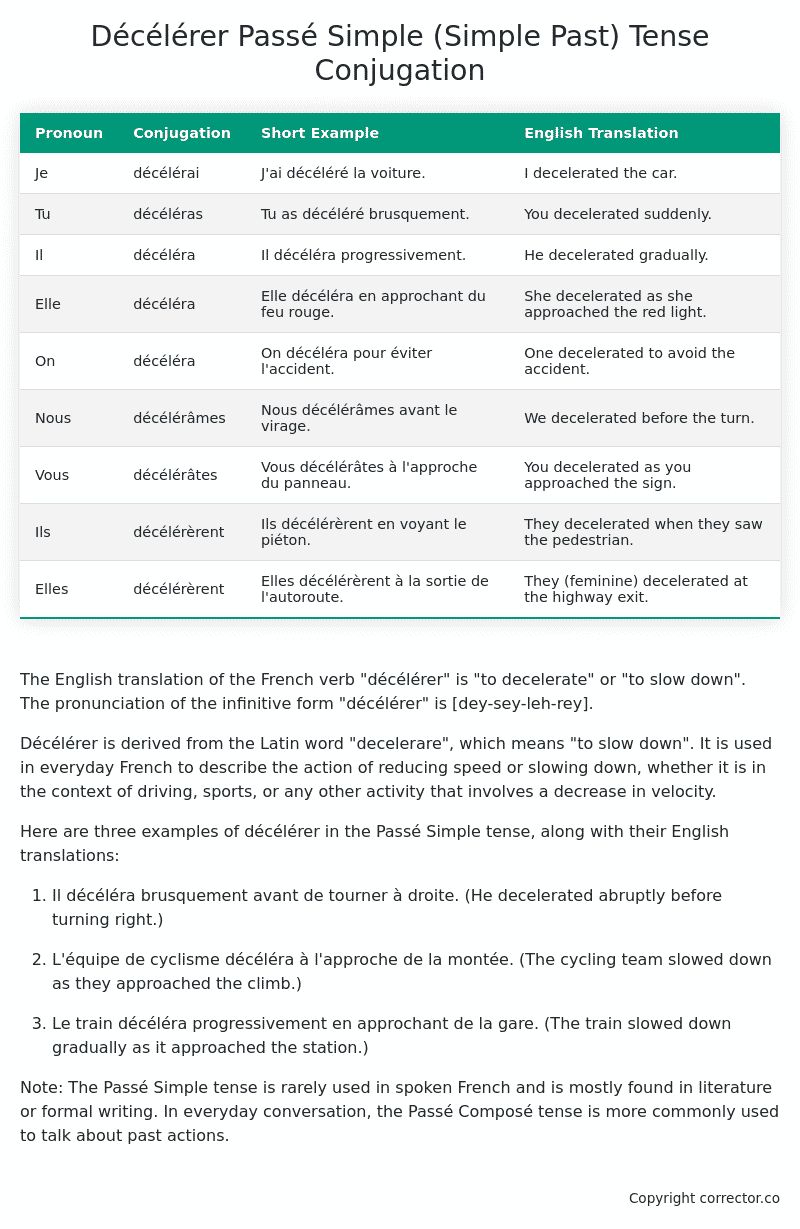Passé Simple (Simple Past) Tense Conjugation of the French Verb décélérer
Introduction to the verb décélérer
The English translation of the French verb “décélérer” is “to decelerate” or “to slow down”. The pronunciation of the infinitive form “décélérer” is [dey-sey-leh-rey].
Décélérer is derived from the Latin word “decelerare”, which means “to slow down”. It is used in everyday French to describe the action of reducing speed or slowing down, whether it is in the context of driving, sports, or any other activity that involves a decrease in velocity.
Here are three examples of décélérer in the Passé Simple tense, along with their English translations:
-
Il décéléra brusquement avant de tourner à droite.
(He decelerated abruptly before turning right.) -
L’équipe de cyclisme décéléra à l’approche de la montée.
(The cycling team slowed down as they approached the climb.) -
Le train décéléra progressivement en approchant de la gare.
(The train slowed down gradually as it approached the station.)
Note: The Passé Simple tense is rarely used in spoken French and is mostly found in literature or formal writing. In everyday conversation, the Passé Composé tense is more commonly used to talk about past actions.
Table of the Passé Simple (Simple Past) Tense Conjugation of décélérer
| Pronoun | Conjugation | Short Example | English Translation |
|---|---|---|---|
| Je | décélérai | J’ai décéléré la voiture. | I decelerated the car. |
| Tu | décéléras | Tu as décéléré brusquement. | You decelerated suddenly. |
| Il | décéléra | Il décéléra progressivement. | He decelerated gradually. |
| Elle | décéléra | Elle décéléra en approchant du feu rouge. | She decelerated as she approached the red light. |
| On | décéléra | On décéléra pour éviter l’accident. | One decelerated to avoid the accident. |
| Nous | décélérâmes | Nous décélérâmes avant le virage. | We decelerated before the turn. |
| Vous | décélérâtes | Vous décélérâtes à l’approche du panneau. | You decelerated as you approached the sign. |
| Ils | décélérèrent | Ils décélérèrent en voyant le piéton. | They decelerated when they saw the pedestrian. |
| Elles | décélérèrent | Elles décélérèrent à la sortie de l’autoroute. | They (feminine) decelerated at the highway exit. |
Other Conjugations for Décélérer.
Le Present (Present Tense) Conjugation of the French Verb décélérer
Imparfait (Imperfect) Tense Conjugation of the French Verb décélérer
Passé Simple (Simple Past) Tense Conjugation of the French Verb décélérer (You’re reading it right now!)
Passé Composé (Present Perfect) Tense Conjugation of the French Verb décélérer
Futur Simple (Simple Future) Tense Conjugation of the French Verb décélérer
Futur Proche (Near Future) Tense Conjugation of the French Verb décélérer
Plus-que-parfait (Pluperfect) Tense Conjugation of the French Verb décélérer
Passé Antérieur (Past Anterior) Tense Conjugation of the French Verb décélérer
Futur Antérieur (Future Anterior) Tense Conjugation of the French Verb décélérer
Subjonctif Présent (Subjunctive Present) Tense Conjugation of the French Verb décélérer
Subjonctif Passé (Subjunctive Past) Tense Conjugation of the French Verb décélérer
Subjonctif Imparfait (Subjunctive Imperfect) Tense Conjugation of the French Verb décélérer
Subjonctif Plus-que-parfait (Subjunctive Pluperfect) Tense Conjugation of the French Verb décélérer
Conditionnel Présent (Conditional Present) Tense Conjugation of the French Verb décélérer
Conditionnel Passé (Conditional Past) Tense Conjugation of the French Verb décélérer
Conditionnel Passé II (Conditional Past II) Tense Conjugation of the French Verb décélérer
L’impératif Présent (Imperative Present) Tense Conjugation of the French Verb décélérer
L’impératif Passé (Imperative Past) Tense Conjugation of the French Verb décélérer
L’infinitif Présent (Infinitive Present) Tense Conjugation of the French Verb décélérer
L’infinitif Passé (Infinitive Past) Tense Conjugation of the French Verb décélérer
Le Participe Présent (Present Participle) Tense Conjugation of the French Verb décélérer
Le Participe Passé (Past Participle) Tense Conjugation of the French Verb décélérer
Struggling with French verbs or the language in general? Why not use our free French Grammar Checker – no registration required!
Get a FREE Download Study Sheet of this Conjugation 🔥
Simply right click the image below, click “save image” and get your free reference for the décélérer Passé Simple tense conjugation!

Décélérer – About the French Passé Simple (Simple Past) Tense
Formation
Usage
Narration
Historical Context
Interactions with other tenses
Passé Composé
Imparfait
Conditional and Subjunctive
Summary
I hope you enjoyed this article on the verb décélérer. Still in a learning mood? Check out another TOTALLY random French verb conjugation!


